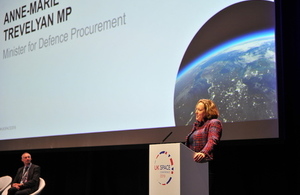£1.5-million boost for space innovation
Defence Minister Anne-Marie Trevelyan has announced a £1.5-million investment in 12 ground-breaking space innovation projects.

Defence Minister Anne-Marie Trevelyan speaking at the UK Space Conference. Crown Copyright
The announcement marks the next step in the Defence Science and Technology Laboratory’s (Dstl) ‘Space to Innovate’ competition, which sought to find and fund new technologies that could improve the UK’s resilience, awareness and capability in space.
The competition, run on behalf of Dstl by the Defence and Security Accelerator, the MOD’s innovation hub, received more than 60 bids from innovators around the world.
The successful entries cover the full spectrum of innovative ideas, from state-of-the-art imaging technology developed at the University of Strathclyde, to futuristic optical communication technology from mBryonics.
The announcement was made by Defence Minister Anne-Marie Trevelyan at the UK Space Conference, which brings together government, industry and academia to discuss the challenges and opportunities offered by space. She said:
It’s vital we harness the ideas of the brightest and best innovators to improve the UK’s resilience and awareness in space.
Faced with growing threats to UK interests, programmes like those selected today will boost our intelligence capability and help us stay ahead of our adversaries.
The successful bidders will share more than £1.5-million of funding, provided jointly by Dstl and the UK Space Agency’s (UKSA) National Space Technology Programme, to further develop the concepts.
Key challenges outlined in the competition include the development of technology to boost the surveillance capability of UK satellites and identify potentially hostile actors in space.
Gary Aitkenhead, Dstl’s Chief Executive, said:
Our role at Dstl is to provide innovative solutions, underpinning science and technology to access the best space has to offer for defence and security, but also to protect our interests against growing threats.
I am delighted that the competition has unearthed a breadth of UK expertise from a good mix of industry, academia, and SMEs. And I welcome the UK Space Agency’s investment which will ensure that the civilian market will also benefit.
Dr Graham Turnock, UK Space Agency Chief Executive said:
The UK Space Agency is leading cross-government efforts to grow a strategic capability in space-based systems, technologies and applications.
The National Space Technology Programme provides vital, early-stage support to innovative technologies which have the potential to play a leading role in future space activities.
The initial stage of development will complete with a demonstration day in summer 2020, at which point further funding may be available.
The publication of the winning bids follows a string of recent announcements on the UK’s military space programme.
At the RAF’s Air & Space Power Conference, the MOD established a new transatlantic team of government and industry personnel, named Team ARTEMIS, to lead a small satellite launch programme and undertake research into the military uses of small satellites.
The MOD also announced the UK as the first formal partner in the US-led Operation Olympic Defender - a multinational military effort formed to strengthen deterrence against hostile actors in space, enhance resilience and preserve the safety of spaceflight.
At the DSEi conference earlier this month, the MOD awarded a contract worth almost £70-million to QinetiQ to develop enhanced satellite receivers and noted its intention to tender contracts to develop the £6-billion SKYNET 6 programme over the next few months.
The UK has a rapidly growing space sector estimated to have generated an income of £15.5-billion last year and employing almost 42,000 people.
You can see the full list of the successful bids on the winners of ‘Space to Innovate’ announcement.